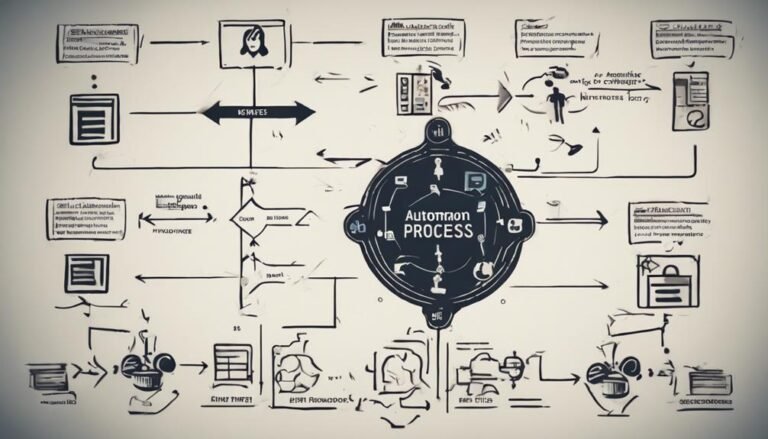Efficiency Tools for Small Businesses
In today's fast-paced business landscape, small businesses face the challenge of maximizing efficiency while minimizing costs. Efficiency tools tailored to the unique needs of small enterprises can be the game-changer they are looking for.
From project management software to automation tools, the market offers a plethora of solutions designed to streamline processes and boost productivity. By leveraging these tools effectively, small businesses can gain a competitive edge and navigate the complexities of modern business operations with agility and precision.
Key Takeaways
- Utilize project management tools for centralized task tracking and team collaboration.
- Communication platforms foster cohesion through virtual meetings and instant messaging.
- Time management apps optimize productivity, resource allocation, and operations.
- Automation solutions streamline tasks, enhance productivity, and reduce errors.
Project Management Software
When it comes to enhancing organization and productivity within small businesses, utilizing project management software is essential. These tools offer a centralized platform for task tracking, allowing teams to monitor progress, set deadlines, and allocate resources efficiently. By enabling team collaboration, project management software promotes seamless communication and fosters a sense of shared responsibility among team members.
Effective task tracking is a cornerstone of project management software, providing real-time updates on project milestones and individual responsibilities. This feature ensures that everyone is on the same page regarding project progress, deadlines, and potential bottlenecks. Moreover, team collaboration features streamline communication by offering discussion boards, file-sharing capabilities, and instant messaging within the platform. This facilitates quick decision-making, enhances transparency, and minimizes the risk of miscommunication.
Communication Tools
Communication tools play a pivotal role in facilitating efficient and effective information exchange within small businesses. In today's fast-paced work environment, virtual meetings have become essential for connecting geographically dispersed teams. Platforms like Zoom, Microsoft Teams, and Google Meet enable real-time collaboration, ensuring seamless communication regardless of physical location. These virtual meeting tools not only save time and money by reducing the need for in-person meetings but also foster team cohesion and productivity.
Instant messaging is another crucial communication tool for small businesses. Applications such as Slack, Microsoft Teams, and WhatsApp offer instant communication, allowing employees to quickly share updates, ask questions, and collaborate on projects in a streamlined manner. Instant messaging platforms are particularly useful for remote teams or employees working different shifts, enabling swift communication without the formality of emails.
Time Tracking Apps
Time tracking apps play a crucial role in enhancing productivity and efficiency for small businesses.
By providing an overview of app features and highlighting their suitability for team use, these tools offer valuable insights into time utilization.
Small businesses can leverage time tracking apps to optimize resource allocation and streamline operations effectively.
App Features Overview
Efficiency in small businesses can be significantly enhanced through the utilization of comprehensive time tracking apps with advanced features. These apps offer seamless app integration with popular tools like project management software and accounting systems, streamlining workflows and data management. Moreover, they prioritize user experience, providing intuitive interfaces and customizable settings to meet individual needs. Below is a table highlighting key features of time tracking apps:
| Feature | Description |
|---|---|
| App Integration | Integrates with other business tools |
| User Experience | Focuses on ease of use and customization |
Best for Teams
To effectively manage time and tasks within a team setting, selecting the most suitable time tracking app can significantly enhance collaboration and productivity.
Team collaboration is vital for the success of any project, especially for remote teams who rely on efficient communication and coordination. Time tracking apps offer features like task assignment, progress monitoring, and timesheet management, making it easier for team members to stay organized and accountable.
By using these tools, small businesses can streamline their workflow, reduce time wastage, and improve overall efficiency. Additionally, tracking time spent on different tasks helps in identifying bottlenecks and optimizing processes.
Choosing a time tracking app that caters to team needs can foster better teamwork and ultimately lead to increased productivity.
Automation Software
Utilizing advanced automation software can significantly enhance operational productivity within small businesses. Workflow optimization and data automation are key features that automation software offers. By streamlining repetitive tasks and processes, businesses can improve efficiency and reduce the margin of error that often accompanies manual work.
Workflow optimization tools within automation software allow businesses to map out their processes, identify bottlenecks, and automate sequential tasks. This not only saves time but also ensures a consistent standard of work across all operations. Additionally, data automation capabilities enable the automatic transfer of information between systems, reducing the need for manual data entry and the associated risks of human error.
Implementing automation software can lead to increased efficiency, cost savings, and improved accuracy in small business operations. By leveraging these tools, businesses can reallocate human resources to more strategic tasks that require creativity and critical thinking, ultimately driving growth and success.
Accounting Solutions
Small businesses can greatly benefit from utilizing automated bookkeeping software and cloud-based financial management solutions. These tools not only streamline the accounting process but also help in maintaining accurate and up-to-date financial records.
Automated Bookkeeping Software
Streamlining financial management processes through the integration of automated bookkeeping software can significantly enhance the efficiency and accuracy of accounting tasks for small businesses. Automated bookkeeping software offers features such as expense tracking, which allows businesses to monitor and categorize expenses in real-time, providing a clear overview of where the money is being spent.
Additionally, these tools simplify financial reporting by generating accurate and detailed reports with just a few clicks. By automating these essential accounting functions, small businesses can save time, reduce errors, and make more informed financial decisions.
Implementing automated bookkeeping software can help small businesses stay organized, compliant, and ultimately improve their overall financial health.
Cloud-Based Financial Management
Implementing cloud-based financial management solutions can revolutionize the way small businesses handle their accounting processes, offering flexibility, scalability, and enhanced accessibility to financial data. When considering cloud-based financial management tools, small businesses can benefit from:
- Real-time Expense Tracking: Track expenses as they occur, providing a clear overview of financial outflows.
- Advanced Forecasting Tools: Utilize data analytics to predict future financial trends and make informed decisions.
- Automated Invoicing: Streamline the invoicing process, reducing errors and improving cash flow management.
- Collaborative Budgeting: Enable multiple team members to work together on budget creation and monitoring, fostering transparency and accountability.
These features empower small businesses to make smarter financial decisions and drive growth effectively.
Customer Relationship Management Systems
Enhancing customer relationships through effective management systems is crucial for small businesses seeking to optimize their operations and increase profitability. Customer Relationship Management (CRM) systems play a vital role in achieving this goal by providing a centralized platform for businesses to track sales, manage customer interactions, and streamline lead generation processes.
CRM systems enable small businesses to track sales performance by monitoring customer interactions, purchases, and feedback. By analyzing this data, businesses can identify trends, forecast sales, and tailor their marketing strategies to better meet customer needs. Moreover, CRM systems help in lead generation by capturing and organizing prospect information, tracking communication history, and automating follow-up processes. This functionality allows businesses to nurture leads effectively, resulting in higher conversion rates and increased revenue.
Conclusion
In conclusion, small businesses can greatly benefit from utilizing efficiency tools such as:
- Project management software
- Communication tools
- Time tracking apps
- Automation software
- Accounting solutions
- Customer relationship management systems
As the saying goes, 'time is money,' and by implementing these tools, businesses can streamline their operations, improve productivity, and ultimately increase their bottom line.
By investing in these solutions, small businesses can position themselves for success in today's competitive market.







